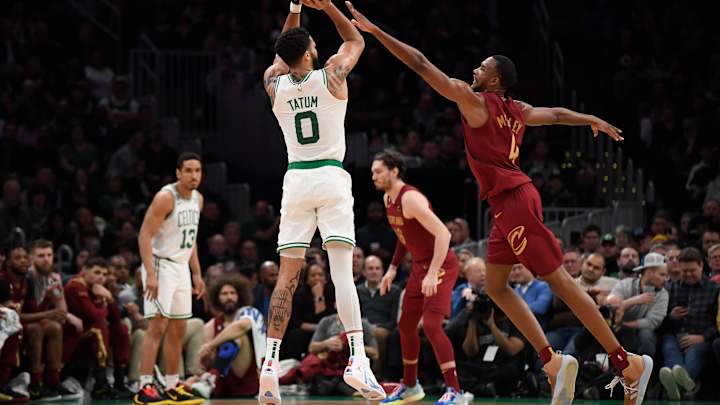The Celtics' Identity Has Changed for the Worst, But There's Time to Recalibrate

Last season, the Celtics' backbone was their defense. They were the best team in the league on that end of the floor. Their ability to lock down opponents, regardless of the star they centered around or the style they played, was the engine that powered the most impressive in-season turnaround in NBA history.
But after coming within two wins of raising banner 18 to the rafters above the TD Garden parquet, a coaching change brought with it a shift in identity. While Ime Udoka's strong suit is defense, offense is Joe Mazzulla's.
Acknowledging that defensive stats are flawed, and it's best to examine a bunch of them rather than trying to find one catch-all to paint a picture with, Boston's fourth in defensive rating and ninth in points allowed per game, per NBA.com.
The Celtics are still one of the top defensive teams in the NBA, even with one of its anchors at that end, Robert Williams, only playing in 28 games.
However, their identity's now tied to their three-point shooting. They take 42.1 per game, the second-most and one fewer than the Warriors. Boston's converting those at a 37.7 percent clip, seventh-best in the Association.
On the heels of blowing a 28-point lead, with the Nets staging the largest comeback in the NBA this season, doing so at TD Garden, Mazzulla conveyed the following.
"Three-point attempt rate is the most important stat in the game of basketball. Because of the pace of play. Because of the shot selection. And because of the ability to go on runs."
Mazzulla's right and teams are hoisting more threes than ever because of it. But shooting is fickler than a top defensive team making that its identity.
The Celtics have acknowledged numerous times that when shots aren't falling, it impacts their play at the other end, especially their transition defense.
It's hard to take a free-flowing approach, play with confidence, and rely on instinct when shots aren't falling, and the prescribed antidote is to launch more threes.
That's the context where twos hold a hidden value. Seeing the ball go through the net, even if it's from mid-range, can help get players in rhythm and makes it easier to get set defensively, which increases the likelihood of getting stops that can fuel transition opportunities. It's a way to stem the tide and pad the lead.
When this author asked Coach Mazzulla about that before Sunday's double-overtime defeat against the Knicks, a game played two days after that loss vs. Brooklyn, his answer was, "we shot 30 (threes) and lost, and they shot 44. And how many layups did we get at the beginning of (the) last game? And did that help us?"
But those layups helped Boston build its 28-point advantage. The gap in threes attempted, with the Nets taking 44 to the Celtics' 29, was crucial in determining the outcome. But so was committing 12 second-half turnovers to Brooklyn's six, resulting in the visitors scoring 15 points off giveaways while the hosts produced six; a nine-point difference in a game it lost by ten.
And why adhere to the expression, "live by the three, die by the three," when a slight recalibration can avoid being content with the latter?
The Celtics have seen it first-hand this season. In wins, they score more from inside the arc, including from the mid-range, than in losses. According to NBA.com, they generate 5.7 percent of their points from mid-range in victories compared to 4.6 percent in defeats.
It's not a drastic drop-off, nor should it be. But it helps win on the margins because the game's not played on a spreadsheet and that slight uptick in twos helps a team find or maintain stability and shoot better from beyond the arc.
Boston's taking 41.9 threes and shooting 40.7 percent from long range in victories. In losses, they attempt 42.5 and convert them at a 31.4 percent clip, per NBA.com. They also take eight mid-range shots in wins compared to 6.7 in defeats. It's a small but meaningful difference in determining how the Celtics fare from beyond the arc and the game's outcome.
After their 117-113 win against the Cavaliers, Jaylen Brown stated, "we started off the game, I think shooting way too many threes. I know that's part of how the game goes, but when you're not making them, getting to the basket, getting some shots that we know we can hit can open those things up.
"Even tonight, we didn't start off the game shooting the ball fantastic, but being able to score in transition, being able to get some open shots and creating for others, (it) just opens the game up a little bit for everybody."
Relying slightly less on threes creates a more likely path to an NBA title than a willingness to let the ship sink when those shots are consistently off the mark.
And getting back to a defensive identity makes it easier to fight through adversity and stay confident and focused when shots aren't finding their way through the net. It's the formula most likely to lead to Boston being the last team standing this season.
Further Reading
Joe Mazzulla Reacts To Grant Williams' Crucial Missed Free Throws
Malcolm Brogdon Shares His Message to the Celtics After Overtime Loss to Cavaliers
Should the Celtics Prioritize Rest Over Their Pursuit of the One Seed? Joe Mazzulla Weighs in
Joe Mazzulla Shares His Perspective on the Roots of the Celtics' Collapse vs. Nets
